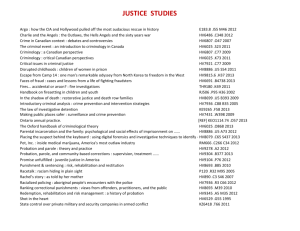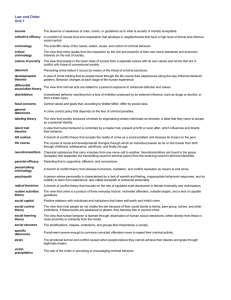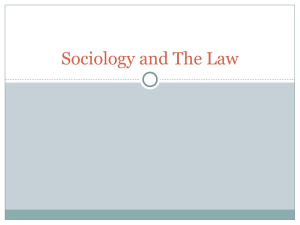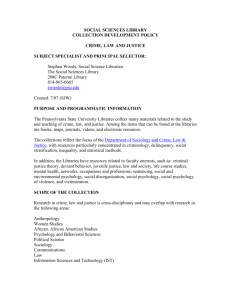Wayland Baptist University Hawaii Campus School of Behavioral and Social Science
advertisement
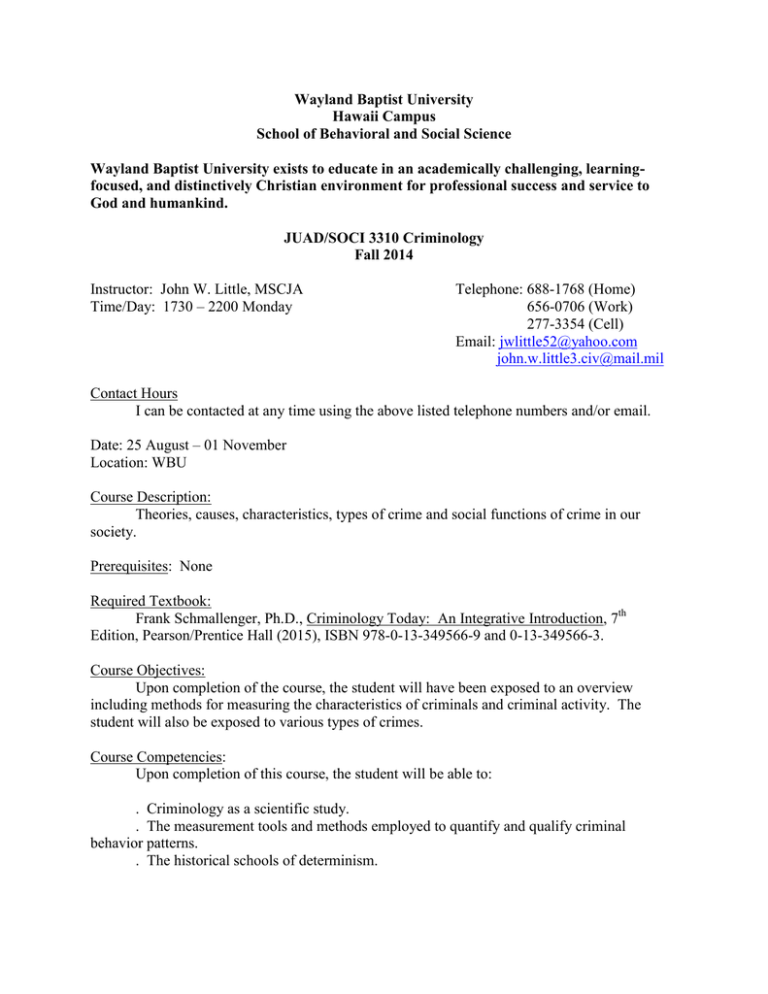
Wayland Baptist University Hawaii Campus School of Behavioral and Social Science Wayland Baptist University exists to educate in an academically challenging, learningfocused, and distinctively Christian environment for professional success and service to God and humankind. JUAD/SOCI 3310 Criminology Fall 2014 Instructor: John W. Little, MSCJA Time/Day: 1730 – 2200 Monday Telephone: 688-1768 (Home) 656-0706 (Work) 277-3354 (Cell) Email: jwlittle52@yahoo.com john.w.little3.civ@mail.mil Contact Hours I can be contacted at any time using the above listed telephone numbers and/or email. Date: 25 August – 01 November Location: WBU Course Description: Theories, causes, characteristics, types of crime and social functions of crime in our society. Prerequisites: None Required Textbook: Frank Schmallenger, Ph.D., Criminology Today: An Integrative Introduction, 7th Edition, Pearson/Prentice Hall (2015), ISBN 978-0-13-349566-9 and 0-13-349566-3. Course Objectives: Upon completion of the course, the student will have been exposed to an overview including methods for measuring the characteristics of criminals and criminal activity. The student will also be exposed to various types of crimes. Course Competencies: Upon completion of this course, the student will be able to: . Criminology as a scientific study. . The measurement tools and methods employed to quantify and qualify criminal behavior patterns. . The historical schools of determinism. . Criminal behavior as posited psychologically, biologically, and other forces of human nature. . Subcultures of America. . Various typologies of crime. . The nature of comparative criminology. Purpose of the Course: Perspectives, working concepts, goals of criminology as well as how crime and criminal justice affects society in general. Attendance: Students enrolled at one of the University’s external campuses should make every effort to attend all class meetings. All absences must be explained to the instructor, who will then determine whether the omitted work may be made up. When a student reaches that number of absences considered by the instructor to be excessive, the instructor will so advise the student and file an unsatisfactory progress report with the campus dean. Any student who misses 25 percent or more of the regularly scheduled class meetings may receive a grade of F in the course. Additional attendance policies for each course, as defined by the instructor in the course syllabus, are considered a part of the University’s attendance policy. Each student will be given 100 point for attendance. Each unexcused absence (TDY with verification or orders and/duty with written verification) 10 points will be deducted. THIS IS NOT NEGOTIABLE. Lateness will be dealt with at the discretion of the instructor. Missed examinations cannot be made up and course work will not be accepted unless turned in on the prescribed day unless the absence is for a documented emergency, documented medical emergency, documented mandatory service to the University, documented mandatory military obligations, or other acceptable reason as deemed by the instructor. The instructor must approve any make-up examination. Delay in contacting the instructor after a missed examination is reason to deny a make-up examination. Services for the Disabled: In compliance with the Americans with Disabilities Act of 1990 (ADA), it is the policy of Wayland Baptist University that no otherwise qualified person with a disability be excluded from participation in, be denied the benefits of, or be subject to discrimination under any educational program or activity in the university. The Coordinator of Counseling Services serves as the coordinator of students with a disability and should be contacted concerning accommodation request at (806) 291-3765. Documentation of a disability must be accompany any request for accommodations. Student Participation: 1. BE THERE – It’s really hard to exchange information if you aren’t there. 2. BE PREPARED BEFORE YOU GET THERE – I will not insult you by reading the text to you. Have the chapters read before you arrive. 3. PARTICIPATE AFTER YOU GET THERE – Ask questions and help others answer questions. Academic Dishonest Policy: There is ZERO TOLERANCE by this professor regarding any student’s research paper, project or test that has been completed using any form of cheating and/or plagiarism. Remember you are taking a Criminal Justice or Human Services and INTEGRITY is the key. Reading Assignments: Reading assignments will be completed prior to class or the student will not be prepared to participate meaningfully in discussions. The student’s grade will be adversely impacted by evidence of failure to read assignments prior to class. Research Papers: WBU degree seeking students are strongly encouraged to retain copies of all research papers. To graduate from WBU, students must complete the senior Exit Seminar, GRAD 4101. The Exit Seminar is designed to capstone an adult learner’s discipline knowledge through the completion of a discipline portfolio or the completion of an approved research project. The research papers retained from previous courses, particularly courses within the discipline, will aid the adult learner in completing the GRAD 4101 course. Course Evaluation: Students will be evaluated upon the following factors: 1. Attendance/Participation: 10% 2. Research Project/Presentation: 45% 3. Final Examination: 45% Final course grade is based upon the following: A = 90 – 100. B = 80 – 89 C = 70 – 79 D = 60 – 69 F = 0 – 59 Grading Criteria: A basic aspect of the teaching-learning process is the evaluation of student performances and the assignment of grades. Student’s performance will be evaluated solely of an academic basis, and not on opinions or conduct in matters unrelated to the course taken generally acceptable academic standards. Faculty are responsible for providing syllabi, which clearly specify course objectives and/or competencies, and for making clear the means of evaluation for purposes of grading students. Students are responsible for class attendance, for learning the content of any course of study and for those standards of academic performance established for a given course. Students who violate academic integrity and regulations by plagiarism, classroom misdemeanor or academic dishonesty will be held accountable by faculty and may have their grades adjusted accordingly. Student grade appeals: Students shall have protection through orderly procedures against prejudices or capricious academic evaluation. A student who believes that he or she has not been held to realistic academic standards, just evaluation procedures, or appropriate grading, may appeal the final grade given in the course by using the student grade appeal process described in the Academic Catalog. Appeals may not be made for advanced placement examinations or course bypass examinations. Appeals limited to the final course grade, which may be upheld, raised, or lowered at any stage of the appeal process. Any recommendation to lower a course grade must be submitted through the Executive Vice President/Provost to the Faculty Assembly Grade Appeals Committee for review and approval. The Faculty Assembly Grade Appeals Committee may instruct that the course grade be upheld, raised, or lowered to a more proper evaluation. TENTATIVE SCHEDULE OF ASSIGNMENTS (SUBJECT TO CHANGE) Week 1 25 August Introduction Course Requirements The Crime Picture Week 2 01 September Holiday Week 3 08 September Crime Causation Week 4 15 September Crime Causation Week 5 22 September Crime Causation Revisited Week 6 29 September Crime Causation Revisited Week 7 06 October Research Project Due Week 8 13 October Crime in the Modern World Week 9 20 October Crime in the Modern World Week 10 27 October Final Examination Week 11 18 December Something Interesting TO ALL CRIMINAL JUSTICE/HUMAN SERVICE/PSYCHOLOGY/SOCIOLOGY STUDENTS You should be aware that the topics covered in my criminal justice, human service, psychology and sociology courses deal with REAL LIFE situation. Consequently, you will often be confronted with, not only theoretical concepts dealing with a particular topic, but also the REALITY of those situations. These realities can often include aural and visual representations that can be disturbing to some: language found in texts and videos considered foul and unacceptable and/or descriptions of minute details regarding the human body including photographs of crime scenes, autopsy photos, videos, and reports. If you find these topics offensive and unacceptable, may I suggest you find another course of study because careers in any of the criminal justice/human service fields (police, courts, corrections, parole, probation, social worker, etc.) are not for you? Should you become employed in any division of these criminal justice/human service fields you will find yourself hearing, seeing, smelling, and otherwise utilizing all your senses while dealing with extremely offensive people and even more offensive circumstances and situations. This career field is neither for the “faint of heart” nor the squeamish. It is important for you to fully understand that just because we TEACH this information; it should in no way be considered to mean we ADVOCATE such a way of life. No one is asking you to adopt these actions and/or language use for your own; just understand that it is part and parcel of the life faced by criminal justice and human service personnel and it must be dealt with in order to bring about justice and fairness to all citizens. If you have any questions regarding this discussion, please feel free to contact me immediately. If I do not receive any inputs from you then I will assume that you fully understand and can comply with the program content. STUDENT INFORMATION SHEET JUAD/SOCI 3310 Criminology INSTRUCTIONS: Please Print Name: ______________________________ (Last, First, and MI) Telephone Number: ______________ (Work) ______________ (Home) ______________ (Cell) ___________________________________ (Research Project) I have received a copy of the course syllabus for JUAD/SOCI 3310, Criminology as well as a copy of the requirements for completion of the course. I fully understand the contents of the course syllabus and the requirements of this course. ____________________ (Student’s Printed Name) ____________________ (Student’s Signature) __________ (Date) GRADING CRITERIA Attendance/Participation: POINTS __________ PERCENTAGE ______________ Term Paper: ___________ ______________ Project: ___________ ______________ Presentation: ___________ ______________ Mid Term Examination: ___________ ______________ Final Examination: ___________ ______________ Quiz’s: ___________ ______________ Reflection Paper: ___________ ______________ Journal: ___________ ______________ Final Grade: ___________ ______________


